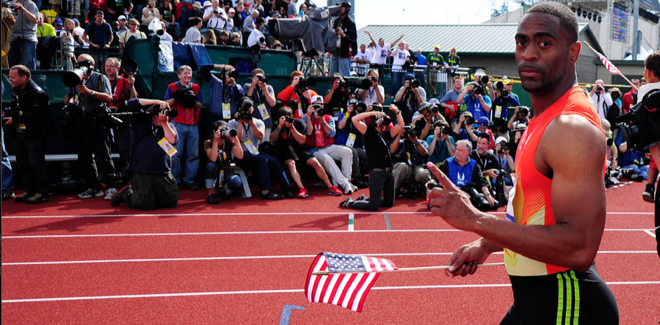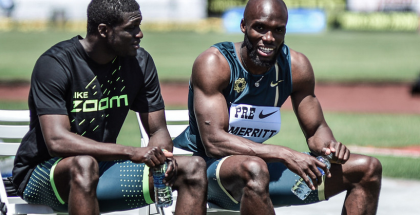Drummond suing Gay and Tygart: What does he need to prove?
Jesse Squire | On 22, May 2014
Yesterday news broke that sprint coach Jon Drummond is suing sprinter Tyson Gay and USADA CEO Travis Tygart for defamation of character.
Recall that Gay failed multiple drug tests last summer and cooperated with USADA in investigating the matter, and claimed that Drummond provided and administered performance-enhancing drugs. Drummond denies these claims and says he was notified in mid-April that USADA intended to seek a lifetime ban against him. Drummond not only acted as Gay’s coach through the 2012 season, but was the US relay coach at the 2012 Olympics and is the chair of USA Track & Field’s Athletes Advisory Committee.
The Fort Worth Star-Telegram’s article is here, and NBC’s Nick Zaccardi has a timeline of events in the Tyson Gay saga. I think it’s safe to say that Gay’s version of events and Drummond’s are different. USADA has called the suit “baseless” and an attempt to circumvent the mandatory arbitration process that applies to all Olympic sports.
Anyone can sue, but winning is far from guaranteed. To find out what it would take, I spoke with Cleveland-based attorney Michael Dylan Brennan.
DR: In general terms, what would Drummond need to prove to win his suit?
MDB: Without looking at the suit, just from looking at the news reports, it appears that Drummond’s suit asserts a claim of defamation. It may assert other claims as well, but for purposes of this discussion, we will stick to defamation law generally (and not any nuances in state law that may apply given where the suit was brought).
In general, defamation is any statement, whether written or oral, that injures a third party’s reputation. See, e.g. Buckley v. Fitzsimmons, 509 U.S. 259 (1993). The tort of defamation includes both libel (written defamation) and slander (spoken defamation).
There are four basic elements to a defamation claim:
1. a false statement purporting to be fact concerning another person or entity;
2. publication or communication of that statement to a third person;
3. fault on the part of the person making the statement amounting to intent or at least negligence; and
4. some harm caused to the person or entity who is the subject of the statement.
Because defamation requires a false statement, one defense to defamation case is demonstrating that the statement is actually true.
So, these tend to be difficult cases, as they often come down to credibility of witnesses. Gay said one thing happened, Drummond counters that it is a lie and that it did not happen. To the extent that this may come down to personal accounts of conversations between Gay and Drummond back when Drummond was coaching him, who will the jury believe when it comes to who or what was said with regard to using those creams? And even if they believe Drummond, that even after going to that chiropractor together that Drummond supposedly instructed, don’t use those creams we got, Drummond still has to prove how his reputation was damaged. Sometimes showing meaningful concrete examples demonstrating the extent of such damage can be difficult. For instance, is there a person who Drummond knows of who would be willing to say on the record something to the effect of, “I was going to train with Drummond, but then I heard what Tyson Gay said, and that changed my mind, and I went with someone else.” Or here, if Drummond risks being suspended based upon Gay’s statements, then that would seem to be a concrete example of damage, certainly if he is suspended, and perhaps to the extent that he has to defend against being suspended.
Another wrinkle worth mentioning is whether or not Drummond qualifies as a public figure. Public figures have less protection from defamation than private citizens. Put another way, if you are in the public eye, especially if you have put yourself there because you are a celebrity, then you expect to endure a certain amount of negative publicity greater than an otherwise private person would. As such, the statement in question would have to be more than false, but made with “actual malice.” Actual malice is the knowledge of falsity or reckless disregard of whether a statement is true or false. Here, I would submit that Drummond is not a household name to everyone (I hadn’t heard of him, but I’m not a close follower of track and field). But a court could find that within the world of track and field, Drummond would be a “limited public figure,” and that within that realm, the actual malice standard would apply to statements about him. If it does, then Drummond would have to prove that Gay’s comments were made with actual malice, that Gay made those statements knowing they were false. Interestingly, it appears that is exactly what Drummond is claiming, that Gay’s statements are knowingly false, so if Drummond can convince a jury that Gay was lying and knew it, then that should cover this higher standard.
DR: What I find quite interesting is that, according to the newspaper article, Drummond is also suing Travis Tygart, the CEO of the US Anti-Doping Agency. In order to win this suit, does Drummond need to show that Tygart is also either lying or acting with reckless disregard for the truth? That he either he knows Gay is lying or reasonably should know? That’s a pretty big accusation to level at the head of one of the nation’s most powerful sports organizations.
MDB: What would be where the actual malice aspect of “reckless disregard of whether the statement is true or false” might apply. Suppose Gay is lying, and if Tygart is repeating Gay’s statements, then he may be repeating those statements in reckless disregard of whether Gay’s statements are true or false. Generally, if you repeat a defamatory statement, you yourself are then opening yourself up to a defamation claim. I would agree that is a pretty big accusation to level, and the burden of proof is on Drummond.
DR: If Tygart can show that he seriously investigated the veracity of Gay’s claims, does that give him some protection?
MDB: If the “actual malice” standard were to apply, then that might, as a serious investigation would tend to suggest that he has not acted in reckless disregard of the truth or falsity of Gay’s statements.



















Comments